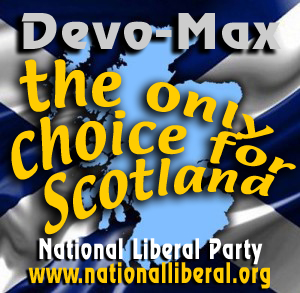Scotland – What’s Going On?
AS MEMBERS and supporters of the National Liberal Party will know, we’ve been campaigning hard to make sure that the vote on Scotland’s future Constitutional status is a truly democratic one.
Previous articles have illustrated our concerns over the options available – as it stands, it’s just a choice between independence and the union. We’re also concerned about the method of voting.
At the moment, all the talk is of simply holding a Scottish Referendum. However, we feel that a Scottish Preferendum will be much more democratic (See NLP Submission to the Scottish Government http://nationalliberal.org/ nlp-submission-to-the-scottish-government).
In this article, Glasgow-based Andrew Hunter provides an overview of the campaign to decide Scotland’s future. In particular, he looks at what the major – and some minor – political parties are proposing.
Sometime in the future, Andrew hopes to provide us with more information on the variations of Devo-Max which seem to be on offer. However, this may take some time. As he commented in his covering notes, the “political parties can be frustratingly vague in what they believe in and it’s often difficult to nail-down what they propose! Sir Menzies Campbell is reported to be working on some constitutional ideas and I think looking at the Calman Commission report might be fruitful. I’ll let you know.”
In the meantime, here’s Andrew’s ‘take’ on what is happening in Scotland at the moment.
–
Scottish Referendum Update:
The Battle Lines have yet to be drawn.
–
 WITH THE referendum on Scotland’s future constitutional status currently scheduled for the autumn of 2014, the campaigns for and against independence and for further devolution have understandably not exactly got into top gear as yet but we can see the way that the various political parties are leaning in this debate. Their stances can be briefly summarised as:
WITH THE referendum on Scotland’s future constitutional status currently scheduled for the autumn of 2014, the campaigns for and against independence and for further devolution have understandably not exactly got into top gear as yet but we can see the way that the various political parties are leaning in this debate. Their stances can be briefly summarised as:
–
Scottish National Party: Full-blown independence from the rest of the UK. Some internal debate has been sparked over possible compromises such as letting the Trident submarine base remain on the Clyde and Scotland becoming a NATO member.
–
Labour: Opposed to independence and instead favours strengthening devolution and supports the recommendations of the Calman Commission.
–
Conservatives: While the Tories have softened their position on devolution, (they campaigned against the establishment of a Scottish Parliament), they are still much in favour of keeping the Union. At their Scottish conference in Troon in March they launched Conservative Friends of the Union to campaign for saving the Union.
–
Liberal Democrats: They are against independence and their Scottish leader is not in favour of a multi-option referendum. The Scottish Lib Dems are reported to be working on their own proposals for reform of the constitutional position.
–
The smaller parties also have their viewpoints on independence. The Green Party support a multi-option referendum and further decentralisation, UKIP are against independence and point to the various bad consequences that they see arising from the SNP’s Independence in Europe policy and the BNP also highlights the SNP’s pro-EU position plus the SNP’s well known pro-immigration views.
–
So, broadly speaking, we have on the one side the SNP putting a case for total political separation from the UK and on the other the various other parties calling for either the enhancement of devolution or no change at all. How will this play out when the starting gun is fired on the referendum campaign proper? Have any alliances been formed to unite parties with common or similar stances?
–
While the SNP is alone in its call for independence, it is most likely quite comfortable in campaigning by itself. It has recently received substantial financial contributions from Colin and Chris Weir of £1m and from Sir Brian Souter of £570,000. These two donations are listed in The Sunday Times Rich List 2012 as the number one and number two largest donations to political parties in 2011. Alex Salmond is a respected politician and able campaigner and so the SNP has the resources to go it alone in the referendum campaign.
–
The other parties that might be generally categorised as unionist have yet to form common cause. As mentioned, the Conservatives have launched their own campaign group which is open to non-party members although this may be more of an acknowledgement of the virtual pariah status that the Tories enjoy in Scotland! At their last leadership contest one candidate stood on a platform of re-naming the party and it is unlikely that Labour and the Lib Dems would view a public coming together with the Tories as anything other than extremely problematic. It is early days yet so it will be interesting to monitor the developments in the anti-independence camp.
–
The National Liberal Party in Scotland continues to add its small voice to getting Devo-Max onto the ballot paper. In addition to the areas mentioned in Glen Maney’s recent report (See Scottish Voters Warming To Devo-Max Option As Third Choice! Of 20/04/2012) leafleting has also been undertaken in the Glasgow suburbs of Bearsden and Mount Vernon and the Lanarkshire towns of Hamilton and Motherwell. There are plans to add other towns to this list over the closing period of the consultation process. Watch this space!
Date: May 5, 2012
Categories: Articles































